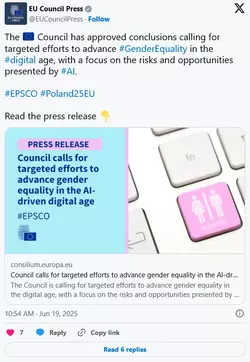Article Archive

The European Union has declared war on “masculinist” algorithms, urging tighter control over AI systems it claims are biased against women.
On Thursday, June 19, the Ministers of Employment and Social Affairs of the European Union approved a series of conclusions that, among other things, call for action against what they describe as “gender bias” in artificial intelligence (AI).
Although artificial intelligence is still in development, Brussels considers it urgent to ensure that the data feeding these systems is “clear, representative, and high-quality.” This would also include establishing human oversight and strictly applying existing anti-discrimination rules. Brussels’ mandate has already restricted generative AIs like ChatGPT or Grok.
https://xcancel.com/EUCouncilPress/status/1935697820180468044

The Council acknowledges AI’s potential to reduce human bias. Even so, it claims that AI can replicate or even amplify inequalities if not properly directed. It therefore calls for the “full participation of men and boys” in the fight against gender inequality and further research into “misogynistic and masculinist content and networks online.”
One of the most striking points in the document is the concern over “technology-facilitated gender violence.” It claims that young women—particularly those in positions of power or belonging to “traditionally discriminated groups,”—are disproportionately affected by online harassment and attacks. According to the European ministers, the solution lies in including specific measures against this type of violence in national action plans.
As if that weren’t enough, the Council also calls for strengthening governmental structures dedicated to gender equality, granting them “a strong and clear mandate” to implement a gender perspective across all public policies.
The EU’s renewed fervor for regulating algorithms is striking, especially after years of inaction on more tangible issues across the continent. Apparently, Europe’s next political frontier is not inflation, uncontrolled immigration, or growing insecurity—but ensuring that ChatGPT or Google don’t reproduce “masculine stereotypes.”
At the same time, the EU acknowledges its lack of technological competitiveness while dedicating itself to regulating and fining others—an apparent attempt to avoid losing control of the narrative.

The European Union has declared war on “masculinist” algorithms, urging tighter control over AI systems it claims are biased against women.
On Thursday, June 19, the Ministers of Employment and Social Affairs of the European Union approved a series of conclusions that, among other things, call for action against what they describe as “gender bias” in artificial intelligence (AI).
Although artificial intelligence is still in development, Brussels considers it urgent to ensure that the data feeding these systems is “clear, representative, and high-quality.” This would also include establishing human oversight and strictly applying existing anti-discrimination rules. Brussels’ mandate has already restricted generative AIs like ChatGPT or Grok.
https://xcancel.com/EUCouncilPress/status/1935697820180468044

The Council acknowledges AI’s potential to reduce human bias. Even so, it claims that AI can replicate or even amplify inequalities if not properly directed. It therefore calls for the “full participation of men and boys” in the fight against gender inequality and further research into “misogynistic and masculinist content and networks online.”
One of the most striking points in the document is the concern over “technology-facilitated gender violence.” It claims that young women—particularly those in positions of power or belonging to “traditionally discriminated groups,”—are disproportionately affected by online harassment and attacks. According to the European ministers, the solution lies in including specific measures against this type of violence in national action plans.
As if that weren’t enough, the Council also calls for strengthening governmental structures dedicated to gender equality, granting them “a strong and clear mandate” to implement a gender perspective across all public policies.
The EU’s renewed fervor for regulating algorithms is striking, especially after years of inaction on more tangible issues across the continent. Apparently, Europe’s next political frontier is not inflation, uncontrolled immigration, or growing insecurity—but ensuring that ChatGPT or Google don’t reproduce “masculine stereotypes.”
At the same time, the EU acknowledges its lack of technological competitiveness while dedicating itself to regulating and fining others—an apparent attempt to avoid losing control of the narrative.